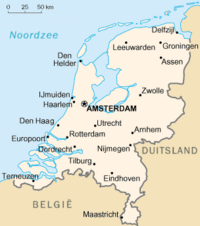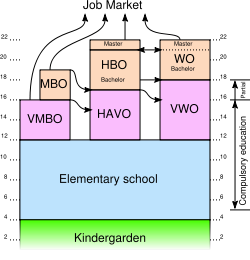Welcome to the Virtual Education Wiki ~ Open Education Wiki
Netherlands
by authorname authorsurname
Experts situated in Country
Country in a nutshell
The Netherlands (Dutch: Nederland) is the European part of the Kingdom of the Netherlands, which consists of the Netherlands, the Netherlands Antilles and Aruba in the Caribbean. The Netherlands is a parliamentary democratic constitutional monarchy, located in Western Europe. It is bordered by the North Sea to the north and west, Belgium to the south, and Germany to the east.
The Netherlands is often called Holland. This is formally incorrect as North and South Holland in the western Netherlands are only two of the country's twelve provinces. Still, many Dutch people colloquially refer to their country as Holland in this way, as a synecdoche.
The Netherlands is a geographically low-lying and the 25th most densely populated country in the world, with 395 inhabitants per square kilometre (1,023 sq mi)—or 484 people per square kilometre (1,254/sq mi) if only the land area is counted, since 18.4% is water. The population in total is 16.3 million.
The Netherlands has an international outlook; among other affiliations the country is a founding member of the European Union (EU), NATO, the OECD, and has signed the Kyoto protocol. Along with Belgium and Luxembourg, the Netherlands is one of three member nations of the Benelux economic union. The country is host to five international (ised) courts: the Permanent Court of Arbitration, the International Court of Justice, the International Criminal Tribunal for the Former Yugoslavia, the International Criminal Court and the Special Tribunal for Lebanon. All of these courts (except the Special Tribunal for Lebanon), as well as the EU's criminal intelligence agency (Europol), are situated in The Hague, which has led to the city being referred to as "the world's legal capital."
Education in Country
Compulsory education (leerplicht) in the Netherlands starts at the age of five, although in practice, most schools accept children from the age of four. From the age of sixteen there is a partial compulsory education (partiële leerplicht), meaning a pupil must attend some form of education for at least two days a week. Compulsory education ends for pupils age eighteen and up.
Basisonderwijs - Primary education
Between the ages of four to twelve, children attend basisschool (elementary school; literally, "basis school"). This school has eight grades, called groep 1 (group 1) through groep 8. School attendance is compulsory from group 2 (at age five), but almost all children commence school at four (in group 1).
Voortgezet Onderwijs - Secondary Education
On leaving primary school basisonderwijs at the age of about 12 (after eight years of primary schooling) children choose between three types of secondary education (voortgezet nderwijs) :
- VMBO (pre-vocational secondary education voorbereidend middelbaar beroepsonderwijs: four years)
- HAVO (senior general secondary education hoger algemeen voortgezet onderwijs: five years)
- VWO (preuniversity education voorbereidend wetenschappelijk onderwijs: six years).
Most secondary schools are combined schools offering several types of secondary education so that pupils can transfer easily from one type to another. All three types of secondary education distinguish between the lower years and the upper years. In the lower years the emphasis is on acquiring and applying knowledge and skills, and delivering an integrated curriculum. Teaching is based on attainment targets which specify the knowledge and skills pupils must acquire. In the first two years of secondary school, 1,425 real hours per year must be spent on the 58 attainment targets. The school itself translates these targets into subjects, projects, areas of learning, and combinations of all three, or into competence-based teaching, for example. Besides English, which is compulsory for all pupils, those in HAVO and VWO study two other modern languages, while pupils in VMBO study one.
VMBO There are four learning pathways in VMBO:
- basic vocational programme;
- middle-management vocational programme;
- combined programme;
- theoretical programme.
After completing VMBO at the age of around 16, pupils can go on to secondary vocational education (MBO). Pupils who have successfully completed the theoretical programme within VMBO can also go on to HAVO. HAVO certificate-holders and VWO certificate-holders can opt at the ages of around 17 and 18 respectively to go on to higher education.
HAVO is designed to prepare pupils for higher professional education hoger beroepsonderwijs (HBO). In practice, however, many HAVO school-leavers also go on to the upper years of VWO and to secondary vocational education middelbaar beroepsonderwijs.
VWO is designed to prepare pupils for university. In practice, many VWO certificate-holders enter HBO. MBO certificate-holders can go on to higher professional education, while HBO graduates may also go on to university.
In addition to mainstream primary basisonderwijs and secondary schools voortgezet onderwijs there are special schools speciaal onderwijs for children with learning and behavioural difficulties who – temporarily at least – require special educational treatment. There are also separate schools for children with disabilities of such a kind that they cannot be adequately catered for in mainstream schools. Pupils who are unable to obtain a VMBO qualification, even with long-term extra help, can receive practical trainingpraktijkonderwijs, which prepares them for entering the labour market.
Young people aged 18 or over can take adult education courses or higher distance learning courses.
Vervolgonderwijs
Mbo (middelbaar beroepsonderwijs, literally, "middle-level vocational education") is oriented towards vocational training. Many pupils with a vmbo-diploma attend mbo. Mbo lasts three to four years. After mbo, pupils can enroll in hbo or enter the job market.
Hbo With an mbo, havo or vwo diploma, pupils can enroll in hbo (Hoger Beroeps Onderwijs, literally "higher professional education"). It is oriented towards higher learning and professional training, which takes four to six years. The teaching in the hbo is standardized as a result of the Bologna process. After obtaining enough credits (ECTS) pupils will receive a 4 years (professional) Bachelor's degree. They can choose to study longer and obtain a (professional) Master's degree in 1 or 2 years.
Wo With a vwo-diploma or a propedeuse in hbo, pupils can enroll in wo (wetenschappelijk onderwijs, literally "scientific education"). Wo is only taught at a university. It is oriented towards higher learning in the arts or sciences. The teaching in the wo, too, is standardized due to the Bologna process. After obtaining enough credits (ECTS), pupils will receive a Bachelor of Arts, Bachelor of Science or Bachelor of Laws degree. They can choose to study longer in order to obtain a Master's degree of different fields. At the moment, there are three variants: Master of Arts, Sciences, and Master of Laws. A theoretical Master typically lasts one year, however the majority of practical (e.g. medical), technical and research Masters require two or three years.
Schools in Country
Further and Higher education
There are two types of higher education in the Netherlands (see also above). The universities prepare students for independent scientific and scholarly work in an academic or professional setting. The hogescholen are universities of applied sciences that prepare students for a wide variety of careers in seven sectors: agriculture, engineering and technology, economics and business administration, health care, education/teacher training, social welfare, and fine and performing arts. This type of higher education is known in Dutch as HBO (hoger beroepsonderwijs). At present there are 14 universities in the Netherlands and 45 universities of applied sciences.
The differences between the universities of applied sciences and the research universities have become less marked in the course of time. Nevertheless, a number of differences remain. Universities of applied sciences offer four-year programmes, leading to a Bachelor's degree, which are strongly geared towards practical training. The programmes focus on specific occupations and include traineeships or work placements that provide students with practical work experience. Universities of applied sciences also offer an increasing number of programmes that lead to a Master's degree.
Universities in Country
Polytechnics in Country
Colleges in Country
Education reform
Schools
Post-secondary
Administration and finance
Schools
Education policy is coordinated by the Dutch Ministry of Education, Culture and Science, together with municipal governments. A distinctive feature of the Dutch education system is the combination of a centralised education policy with decentralised administration and management of schools. In August 2006 the government introduced block grant funding in primary education in order to give schools more freedom in terms of spending. School boards have been given a certain budget and the freedom to decide on the spending. For secondary education block grant funding was introduced in 1996. Central government controls education by means of regulations and legislation, taking due account of the provisions of the Constitution. Its prime responsibilities with regard to education relate to the structuring and funding of the system, the management of public-authority institutions, inspection, examinations and student support. Central government also promotes innovation in education. The Minister is, moreover, responsible for the coordination of science policy, emancipation policy of women and gays and for cultural and media policy. There are public, special (religious), and private schools. The first two are government-financed and officially free of charge, though schools may ask for a parental contribution (ouderbijdrage). Public schools are controlled by local governments. Special schools are controlled by a school board. Special schools are typically based on a particular religion. There are government financed Catholic and Protestant elementary schools, high schools, and universities, furthermore there are government financed Jewish and Muslim elementary schools and high schools. In principle a special school can refuse the admission of a pupil if the parents indicate disagreement with the school's educational philosophy. This is an uncommon occurrence. Practically there is little difference between special schools and public schools, except in traditionally religious areas like Zeeland and the Veluwe (around Apeldoorn). Private schools do not receive financial support from the government. There is also a considerable number of publicly financed schools which are based on a particular educational philosophy, for instance the Montessori Method, Pestalozzi Plan, Dalton Plan or Jena Plan. Most of these are public schools, but some special schools also base themselves on any of these educational philosophies.
Post-secondary
Quality assurance
Schools
All school types (public, special and private) are under the jurisdiction of a government body called Onderwijsinspectie (Education Inspection) , which supervises the quality of education under the responsibility of the Minister of Education, culture and Science. The Inspectorate bases its assessments on the principle that the institutions themselves bear primary responsibility for the quality of teaching. The right of the authorities to supervise education is derived from article 23 of the Constitution; the details are worked out in the Education Inspection Act (WOT) and the Inspectorate’s annual work plan. The Inspectorate monitors and promotes the quality of education in Dutch educational establishments, based on a thorough knowledge of individual schools and institutions. Regular and systematic visits are made to schools and institutions for this purpose. A report of the Inspectorate’s findings is sent to the school or institution concerned, to the Minister and State Secretaries, and to parliament. Under the Education Inspection Act the duties of the Inspectorate are:
- to assess the quality of teaching on the basis of checks on compliance with legislation;
- to monitor compliance with legislation;
- to promote the quality of teaching;
- to report on the development of education;
- to perform all other tasks and duties required by law.
Under the Primary Education Act (WPO), the Secondary Education Act (WVO) and the Adult and Vocational Education Act (WEB), school boards bear primary responsibility for ensuring the quality of teaching. As the competent authority, they are the point of contact for inspections. Wherever possible, risk analyses are conducted on the basis of existing information. The Inspectorate will not ask for supplementary information unless risks are identified and a further inspection is considered necessary.
Post-secondary
Information society
Access to online information and knowledge 2009, country report on the Netherlands
ICT and environmental sustainability 2010, country report on the Netherlands

